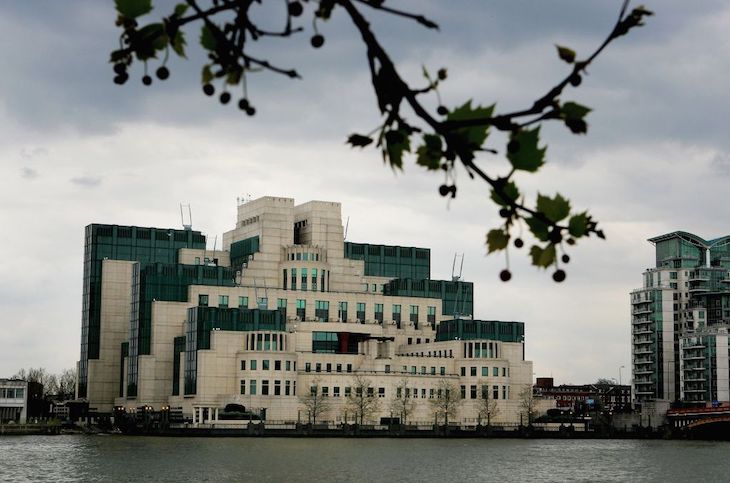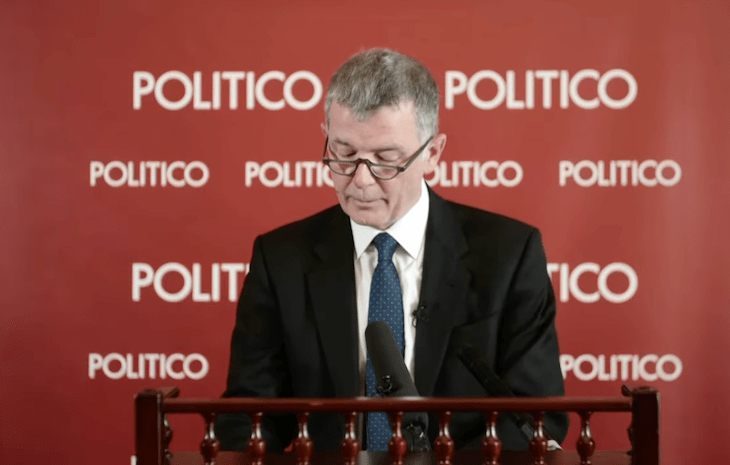Sir Richard Moore, head of the Secret Intelligence Service – MI6 – follows the tradition of only giving one public address a year, so it is inevitably scrutinised carefully for signs and portents. His speech at the UK embassy in Prague, inviting Russians to spy for Britain, required no particular reading between the lines.
After a suitable preamble noting Britain’s strong relationship with the Czech Republic, he pivoted from Moscow’s brutal suppression of the liberal Prague Spring in 1968 to Soviets, the bravest of whom, seeing ‘the moral travesty of what was being done…acted on their convictions by throwing in their lot with us, as partners for freedom.’
This was indeed a moment which shattered any remaining faith in the system for many Soviets, including Oleg Gordievsky, one of MI6’s most important double agents within the KGB. However, Sir Richard wasn’t just indulging in a historical diversion. He was issuing an invitation to those ‘many Russians today who are silently appalled by the sight of their armed forces pulverising Ukrainian cities, expelling innocent families from their homes, and kidnapping thousands of children.’
The job of a ‘spy’ is not to break into top-secret facilities in a tuxedo, but, put bluntly, to encourage foreigners to betray their country
What should they do? ‘I invite them to do what others have already done this past 18 months and join hands with us. Our door is always open.’ In other words, this was an encouragement to Russians to offer themselves up as assets. Recruitment is, of course, what a human intelligence service such as MI6 is all about, and something at which it is really rather good.
The job of a ‘spy’ is not to break into top-secret facilities in a tuxedo, but, put bluntly, to encourage foreigners to betray their country. This is hard, and for every such asset recruited through moral inducement, there are likely more driven by less positive forces. The classic acronym to explain this is MICE: Money, Ideology, Compromise and Ego. Everyone likes to feel they are the good guy, though, so even the most venal of assets probably like to hear they are the best and the brightest.
This tends to involve lengthy and careful cultivation. In today’s Russia, that is difficult. Most case officers work under diplomatic cover, but rounds of tit-for-tat expulsions have left Western embassies and consulates in Russia closed or pared to the bone. Suspected intelligence officers are kept under surveillance, anyone they meet potentially subject to scrutiny and arrest.
Hence the need to find alternative channels. America’s CIA recently launched on social media a Russian-language video, rather unimaginatively called ‘Why I made contact with the CIA: My decision’. It showed actors playing Russian officers secretly contacting the CIA through a darkweb portal, encouraging them to believe ‘I am not powerless.’

Sir Richard’s pitch was likely also a bit of trolling, but it reflected a very real belief that, as CIA director William Burns has also said, this is a ‘once in a generation’ opportunity for recruiting agents. It is hard to operate in Russia, but the levels of disaffection – including within the state structures and even the security services – has not been as great for decades.
Of course, Britain has some unique advantages and disadvantages. Despite all the sanctions, there is still a deep vein of Anglophilia, despite or perhaps tied up with a sense that ‘perfidious Albion’ remains Russia’s most subtle adversary. Whenever anything goes wrong for Moscow, you can be sure London will be blamed somehow.
It is perhaps a testament to this that a Russian press usually so quick to castigate every example of ‘British Russophobia’ has scarcely mentioned Sir Richard’s speech, focusing instead on such salient matters as Moscow’s impending ban on cats being walked off the lead. Life News, a source considered close to Putin’s Federal Security Service, instead only reported Sir Richard’s comments about the importance of China to MI6’s work; the nationalist Orthodox outlet Tsargrad tried to make something of his refusal to confirm or deny that Britain played any role in the recent attack on the Crimean Bridge.
Foreign ministry spokeswoman Maria Zakharova, classy as ever, alluded to the attempted murder of defector Sergei Skripal in 2018. This is perhaps the biggest impediment to recruitment. Vladimir Putin makes no secret of his belief that treachery is the greatest sin of all. Skripal’s attempted murder, and the assassination of Alexander Litvinenko in 2006 have left their mark. Sir Richard made great play of the ‘discretion and professionalism’ with which any overtures would be treated, and reassured potential agents that ‘our loyalty to our agents is lifelong – and our gratitude eternal.’ As Putin continues to ruin Russia, though, at what point do patriots come to accept that – in this one particular circumstance – the best thing they can do to save Russia is to betray it?







Comments